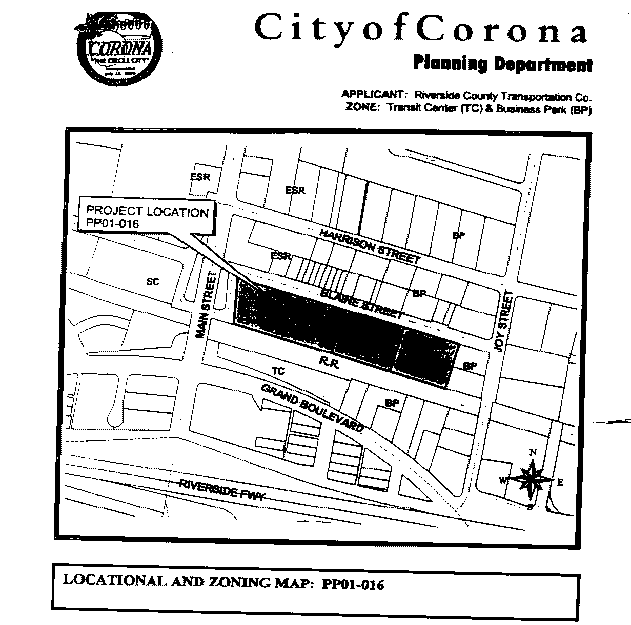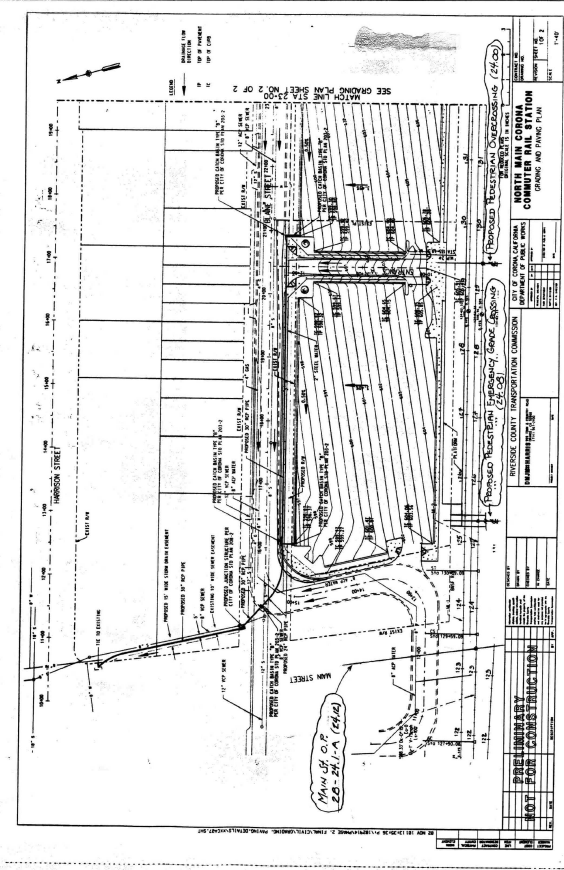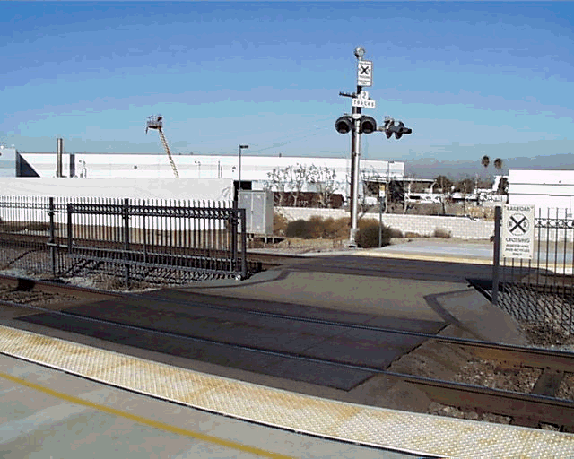Discussion
The Southern California Regional Rail Authority operates Metrolink commuter rail service in five counties in Southern California, namely Los Angeles, Orange, Ventura, San Bernardino and Riverside Counties. RCTC proposes to construct a Metrolink station on the south side of Blaine Street and east of the Main Street overpass north of the BNSF right of way in the City of Corona, County of Riverside. The proposed commuter rail station will become the second Metrolink station in the City. The availability of this additional station is anticipated to contribute to easing congestion on the State Route 91 Freeway and the existing Metrolink station.
The rail line consists of two tracks that will travel in east- and westbound directions. A third track maybe added in the future with the success of the proposed commuter rail system. The proposed overhead pedestrian bridge will span rail tracks connecting the two-inbound/outbound platforms, which are handicap-accessible. The exterior of the pedestrian bridge will consist of two metal clad steel frame towers. Each tower will be equipped with an elevator and stairs to gain access to the pedestrian bridge.
The proposed pedestrian bridge will allow passengers to safely access the station loading/unloading platforms, which are to be constructed on each side of the existing two main BNSF tracks. The bridge will also be designed to span a future planned third main line BNSF track. In addition, an emergency grade crossing will be constructed at the west end of the station platforms. The proposed emergency crossing will allow access to the platforms whenever the pedestrian bridge elevators are inoperable. The emergency grade crossing will be designed with automatic crossing protection utilizing lights and audible warning devices. There will also be an inter-track fence and a locked gate at the grade crossing that will be controlled by RCTC-contracted security forces.
City, on behalf of RCTC, is the lead agency for this project under the California Environmental Quality Act of 1970 (CEQA), as amended, Public Resources Code 21080 (b) (11) et seq. City prepared an Initial Study/Environmental Checklist dated September 17, 2001 for this project in accordance with the City's local guidelines for implementing the CEQA. City
concluded that the proposed project could have a significant effect on the environment; however, the potentially significant effects have been analyzed and mitigated to a less-than-significant level. City believes there is no evidence that the proposed project will have the potential for adverse effect on wildlife resources and the impacts are found to be de minimis pursuant to Section 711.4 of the Fish and Game Code. In September 26, 2001, City filed a Negative Declaration with the Riverside County Clerk's Office, which found that the project would not have a significant effect on the environment.
The Commission is a responsible agency for this project under CEQA. CEQA requires that the Commission consider that portion of the environmental consequences of a project within its area of expertise that is subject to its discretionary approval. In particular, to comply with CEQA, a responsible agency must consider the lead agency's environmental impact report or Negative Declaration prior to acting upon or approving the project (CEQA Guideline Section 15050(b)). The specific activities that must be considered by a responsible agency are contained in CEQA Guideline Section 15096.
The Commission has reviewed the environmental documentation prepared by the City. The City environmental review found no significant environmental impacts and approved the project without mitigation measures. The Commission is not aware of any information to suggest that the City's environmental review and conclusions are inadequate. Accordingly, we will adopt the City's findings that the project will not have a significant effect on the environment.
The Commission's Rail Safety and Carriers Division staff have inspected the site of the proposed project. Staff examined the safety of and need for the pedestrian overpass and the emergency pedestrian crossing and recommends that the construction be approved.
The application was found to be in compliance under Commission's filing requirements, including Rule 38 of Rules of Practice and Procedure, which relates to the construction of public highways across railroad tracks. A location map and details from the project plans are shown in Appendix A.
In Resolution ALJ 176-3079, dated January 9, 2002, the Commission preliminarily categorized this application as ratesetting, and preliminarily determined that hearings were not necessary. Since no hearings were held, this preliminary determination remains accurate. Given these developments, public hearing is not necessary, and it is not necessary to disturb the preliminary determinations made in Resolution ALJ 176-3079.
This is an uncontested matter in which the decision grants the relief requested. Accordingly, pursuant to Public Utilities Code Section 311(g)(2), the otherwise applicable 30-day period for public review and comment is being waived.
1. Notice of the application was published in the Commission Daily Calendar on December 24, 2001. There are no unresolved matters or protests; a public hearing is not necessary.
2. RCTC requests authority to construct a pedestrian overpass over BNSF's main tracks at railroad milepost 24.0 and a pedestrian emergency grade crossing at railroad milepost 24.08 as part of the new Metrolink station in the City of Corona, County of Riverside.
3. The proposed pedestrian overpass will allow passengers to safely access the station loading/unloading platforms. The emergency crossing will allow for access to the platforms whenever the pedestrian bridge elevators are inoperable.
4. Public convenience, necessity and safety require construction of the pedestrian overpass, and pedestrian emergency grade crossing as part of a new Metrolink station.
5. Public safety requires that the emergency pedestrian grade crossing be protected by two Standard No. 10 flashing lights type devices (Commission General Order 75-C) and a rolling gate system.
6. City of Corona, on behalf of RCTC, is the lead agency for this project under the CEQA, as amended. On September 17, 2001, City prepared an Initial Study/Environmental Checklist. On September 26, 2001, City filed a Negative Declaration with the Riverside County Clerk's Office, which found that the project will not have a significant effect on the environment.
7. The Commission is a responsible agency for this project and has reviewed and considered the lead agency's Initial Study/Environmental Checklist and Negative Declaration.
8. The Commission adopts the City's findings under CEQA that the project will not have a significant effect on the environment.
The application should be granted as set forth in the following order.
IT IS ORDERED that:
1. Riverside County Transportation Commission (RCTC) is authorized to construct a pedestrian overpass, to be identified as CPUC Crossing Number 2B-24.0-AD and a pedestrian emergency grade crossing, to be identified as CPUC Crossing Number 2B-24.08-D, as part of the new Metrolink Station, in City of Corona, Riverside County, as set forth in Appendix A, and as more fully described and indicated by text and plans attached to the application.
2. Protection at the emergency pedestrian crossing shall be two Standard No. 10 flashing light type devices (Commission General Order (GO) 75-C) and a rolling gate system.
3. Construction and maintenance of the crossings shall be in accordance with the provisions of GO 72-B.
4. Clearances shall be in accordance with GO 26-D. Walkways shall conform to GO 118. Walkways adjacent to any trackage subject to rail operations shall be maintained free of obstructions and shall be promptly restored to their original condition in the event of damage during construction.
5. Construction and maintenance costs shall be borne in accordance with an agreement entered into between parties. A copy of the agreement shall be filed by RCTC with the Commission's Rail Safety and Carriers Division prior to commencing construction.
6. Within 30 days after completion of the work under this order, RCTC shall notify the Commission in writing that the authorized work was completed.
7. This authorization shall expire if not exercised within three years unless time is extended or if the above conditions are not complied with. Authorization may be revoked or modified if public convenience, necessity, or safety so require.
8. The application is granted as set forth above.
9. Application 01-12-024 is closed.
This order becomes effective 30 days from today.
Dated April 22, 2002, at San Francisco, California.
LORETTA M. LYNCH
President
HENRY M. DUQUE
CARL. W. WOOD
GEOFFREY F. BROWN
MICHAEL R. PEEVEY
Commissioners



(End of Appendix A)


